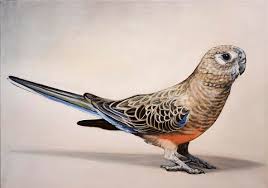
Bourke’s Parrot
Conditions of detention
Bourke’s parrots require a spacious cage that allows for ample movement and flight. The cage should be equipped with horizontal bars for climbing, perches, toys, and enrichment activities. It’s important to place the cage in a well-lit area away from drafts and direct sunlight.
Useful Fact: Bourke’s parrots are crepuscular, meaning they are most active during dawn and dusk. Providing a safe, quiet environment during these times allows them to engage in their natural behaviors.
Nutrition and diet
A balanced diet for Bourke’s parrots includes high-quality seeds, pellets, fresh fruits, and vegetables. Foods such as leafy greens, carrots, apples, and berries provide essential vitamins and nutrients.
Useful Fact: Bourke’s parrots are prone to obesity, so it’s important to monitor their diet and provide regular opportunities for exercise.
Health
Bourke’s parrots are generally hardy birds but can be prone to certain health issues such as respiratory infections, mites, and nutritional deficiencies. Regular veterinary check-ups are important for maintaining their health.
Useful Fact: Keeping their living environment clean and ensuring they have access to fresh water at all times can help prevent common health issues.
Grooming and care
Bourke’s parrots groom themselves by preening their feathers and enjoy occasional baths. Providing a shallow dish of water for bathing or misting them lightly with water can help maintain healthy feathers.
Useful Fact: Regular cleaning of the cage and accessories is crucial to prevent bacterial growth and ensure a hygienic environment.
Education and training
Bourke’s parrots are intelligent and can become accustomed to their owner’s presence and routines. They are not known for talking or performing tricks like some other parrot species, but they can be trained to step up on a finger and interact gently with their owners.
Useful Fact: Consistent handling and interaction can help build trust and strengthen the bond between you and your Bourke’s parrot.
Toys and entertainment
Toys are essential for the mental stimulation and well-being of Bourke’s parrots. They enjoy simple toys, including swings, bells, and foraging toys. It is important to rotate toys regularly to keep them engaged.
Useful Fact: Natural branches and chewable toys can provide entertainment and help satisfy their instinct to gnaw and explore.
Safety
Safety considerations include ensuring that the cage is free of sharp edges and that the bar spacing is appropriate to prevent escape or injury. Keep them away from toxic substances, including certain household plants and fumes.
Useful Fact: Avoid using non-stick cookware around Bourke’s parrots, as the fumes can be toxic and even fatal to birds.
Accessories
Bourke’s parrots require a variety of accessories for their cage, including perches, food and water dishes, and toys. Accessories should be made from safe materials like untreated wood or stainless steel.
Useful Fact: Using perches of different diameters can help maintain foot health by preventing pressure sores and providing natural exercise.
Socialization
Bourke’s parrots are social creatures and enjoy interaction with humans and other birds. They should not be kept in isolation for extended periods.
Useful Fact: Bourke’s parrots can be housed with other small, peaceful bird species, as they are generally non-aggressive and enjoy social interaction.
Travel and Transportation
When traveling with Bourke’s parrots, use a secure and well-ventilated travel carrier. It’s important to keep the cage covered during transport to reduce stress.
Useful Fact: Familiarizing your Bourke’s parrot with the travel carrier by placing it in their living space and allowing them to explore it before any trips can help reduce travel-related anxiety.
Behavior and psychology
Bourke’s parrots exhibit a range of behaviors and vocalizations that indicate their mood and health. Understanding these signals is essential for proper care.
Useful Fact: Bourke’s parrots are known for their calm and gentle demeanor, making them ideal companions for those seeking a quiet pet bird.
Legal aspects
In most areas, there are few legal restrictions on keeping Bourke’s parrots as pets, but it is important to ensure that any Bourke’s parrots purchased are from reputable breeders or pet stores and not taken from the wild.
Useful Fact: Always check local regulations to ensure compliance with laws regarding pet ownership and breeding, as some areas may have specific requirements.


